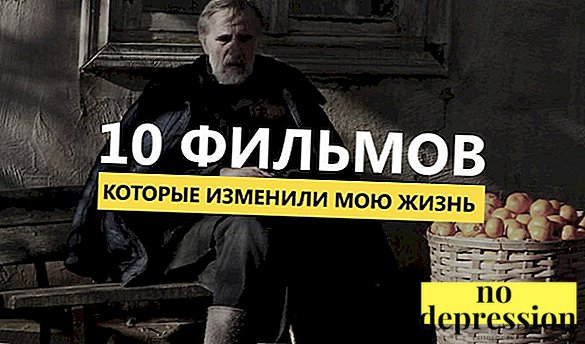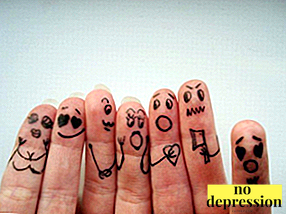Schizophrenia in childhood manifests itself differently than adults.
For example, a significant development lead is so important for the vanity of many parents that they cannot even think about anything else.
Meanwhile, this phenomenon deserves close attention. Often it is among the symptoms and signs of schizophrenia in children - severe mental illness.
The concept and characteristics of the disease
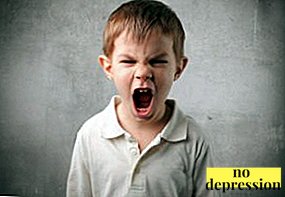
Under schizophrenia understand severe mental disorderarising from violations of the logical coherence of mental activity and leading to the death of the individual.
Children suffer from this disorder much less frequently than adults.
Only one percent of children in a hundred are prone to schizophrenia. However, the appearance of unusual moments in the development and activity of the child should not be overlooked.
This is especially true of excessive isolation, unfounded fears, and even delusions and hallucinations. All this inevitably slows down and distorts the development of a growing personality.
Main features
The situation is complicated by the fact that in children the signs of mental disorder seem to be erased, not as pronounced as in adults.
All patients symptoms are categorized on:
- negative;
- productive.
The first group includes abnormal phenomenagradually emerging as the little man grows. This is an irrepressible fantasy, delusions, hallucinations.
In both children and adults, all symptoms of schizophrenia can be divided into productive and negative.
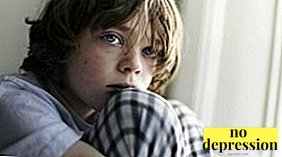
The second group of symptoms includes quality, leaving in the course of the development of pathology (emotionality, interest in life).
The person goes into himself, is focused on the thoughts and ideas that are driven only by him.
Often, schizophrenia is taken for oligophrenia. Their initial stage is in many ways similar: for no reason at all does the child begin to regress in all respects.
Speech loses clarity and meaning, intellect falls, the child increasingly prefers to crawl on the floor or jump on all fours, although he used to go like everyone else.
Symptoms by age
How to recognize schizophrenia in a child? The manifestations of the disease in different children have their own characteristics.
In the early preschool years
For young preschoolers younger than 7 years old monotonous actions for example, walking around the perimeter of a room or running in a closed circle, meaningless shifting things from place to place, striking a pen or pencil over paper.
Kid cries often for no apparent reason, he is nervous, his mood abruptly and without any visible reason is replaced by the opposite.
Schoolchildren
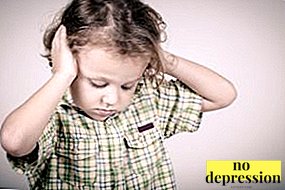
On schizophrenia in a school-age child indicate distorted perception, violation of mental activity.
The child either directly notifies of an overvalued idea, or demonstrates it with all his behavior.
Often, he sets out a completely cohesive chain - coherent from the position of pathological perception of cause and effect.
Often it seems to him that the threat hangs over his family, that in fact he is not brought up by his real parents. The child can not clearly explain his thought when describing items constantly breaking down on secondary signs.
Teenagers
So-called “metaphysical intoxication” is characteristic of girls and boys with mental disorders. This term is called baseless philosophizingbased on some ephemeral principles that have nothing to do with reality.
The patient does not accept his body, his features, he seems to himself to be ugly, fat, short-legged, or vice versa, too long, although in reality this is not at all the case.
Standard adolescent maximalism and stubbornness in schizophrenia take pathological forms, the patient becomes in the most direct sense the enemy of everything.
Often this is accompanied by grimaces, antics, deliberately "kid" behavior (hebephrenic syndrome).
Pediatric Schizophrenia - symptoms and diagnosis from the doctors of Israel in this video:
Causes
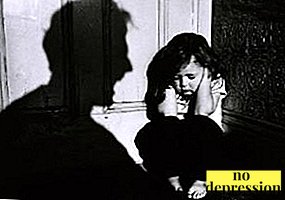
Definitely answer the question: where do children get mental disorders, such as schizophrenia, medicine can not yet answer.
The official version is considered to be a complex of various factors that influence the development of a person:
- Biological (individual features of the development of the disease). It is believed that the likelihood of developing pathology is directly related to viruses (herpes; Epstein-Bar, rubella). This also includes genetic predisposition, immune and autoimmune features. According to scientists, cannabis poisoning is also one of the causes of schizophrenia.
- Psychological. If a small person is overly focused on himself, is closed, unsociable, overly messy, passive, unreasonably afraid of something, cannot be bound to state events - this is the reason for going to a psychiatrist.
- Social (tense situation within the family, life in big cities provoke mental pathologies).
You can not judge the presence of the disease on one or even two factors. Pathology is indicated by a number of phenomena. According to doctors, almost everyone is predisposed to one or another mental pathology.
But this does not mean that he is guaranteed to get sick. Conversely, a person can survive the hardest shocks, but never experience bouts of schizophrenia, because he is not predisposed to it.
Heredity plays an important role.
Classification and clinical forms
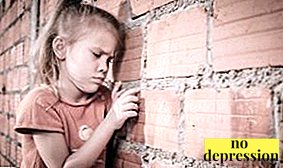
Schizophrenia in children manifests itself in the form of:
- paranoid (too strong fantasies, delirium, obsessions, anorexia, pathological dissatisfaction with oneself, especially among teenage girls);
- malignant (starts at an early age, is characterized by a sharp predominance of negative symptoms, there is a loss of speech);
- recurrent (hallucinations, delirium, catatonic stupor);
- paroxysmal-progressive;
- sluggish (the most common option for children, very often coincides with the signs of special talent, such children are ahead of their peers on several points of development and are even considered geeks).
Of course, when detecting several signs Do not draw disappointing conclusions. Teenage girls are characterized by maximalism, they only want to be dazzlingly beautiful and nothing else. They are not yet fully aware that there are no perfect people.
But if a teenager refuses to eat, he experiences constant stress, an obsession with a problem that is often non-existent - this is a reason to contact a psychiatrist.
Complications
The success of treatment of schizophrenia, however, like any other disease, due to the timeliness of seeking qualified psychiatric care. In its absence the disease progresses, leads to social maladjustment.
As a small person grows, other problems arise - this is the tendency to vagrancy, and to the abuse of alcohol and drugs. A schoolboy, even a well-trained student, begins to start school and skips lessons.
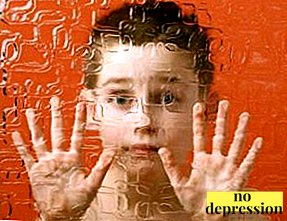 Clearly manifest excessive desire for solitude, obsession with crazy ideas, Often these children leave home, wander, become deviant.
Clearly manifest excessive desire for solitude, obsession with crazy ideas, Often these children leave home, wander, become deviant.
Rises risk of suicide. The treatment of advanced stages is much more complicated and does not always lead to a satisfactory result. The patient becomes disabled.
Diagnostics
For diagnostics experts apply a number of methods:
- clinical;
- clinical and biographical;
- psychological.
The psychiatrist talks with the baby, observes his games, analyzes his actions, his way of thinking, drawings.
For the test, the child is asked to draw something on a piece of paper. The plot is usually free. So little man expresses his experiences, reveals the most characteristic tendencies of frustration (see photo). Signs indicate pathology:
- Repetitions of the same elements.
- Images and symbols, some letters that are not understandable to anyone except the author himself.
- Non-existent animals (can not draw a single existing, even schematically).
- Unnatural selection of colors.
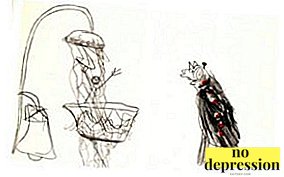 The so-called "figure in the picture", depicted as if two plots, one penetrates the other.
The so-called "figure in the picture", depicted as if two plots, one penetrates the other.- Unfinished, unrelated pictures.
- Persistent avoidance of one or another color (usually black and red).
The drawing itself will not give an answer to the question whether the child is sick or not, it only acts as a kind of trouble indicator in the body.
Treatment
Schizophrenia is cured with medication (neuroleptics) and psychotherapy. The latter happens:
- individual;
- group;
- family.
A complex of corrective measures that compensate for cognitive deficits and help to restore social skills in society is considered effective.
With timely treatment for medical care, about a quarter of patients forget about attacks forever. Relief of seizures already with a serious degree of development of schizophrenia almost always guarantees a relapse.
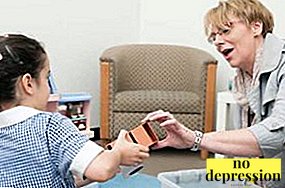 Treatment occurs mainly in the hospital, since the behavior of patients is often deviant and threatens not only other people, but also the patient himself.
Treatment occurs mainly in the hospital, since the behavior of patients is often deviant and threatens not only other people, but also the patient himself.
When the acute condition is suppressed, stabilization - at least five to six months (it is not by chance that they talk about autumn and spring exacerbations), but sometimes they stretch for a year or even more.
Only the attention and support of the patient from the family and doctors guarantee a long remission and reduce the risk of recurrence.
The forecast is favorable only if timely measures are taken. According to the doctors, the most optimistic prospects are patients who have suddenly developed schizophrenia.
About the treatment of schizophrenia in children at home and in the hospital in this video:
Features of education and social adaptation
Measures for the rehabilitation of a schizophrenic child are aimed at returning to the former life and preventing relapses. Children are sent to schools of a special type, workshops, and creative associations.
Also possible return to the old school and the previous training program. This approach requires the constant involvement of a mentor - a social educator or a psychologist.
Prevention
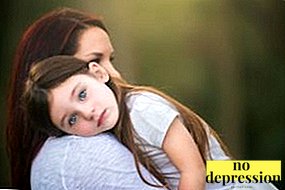
All risk factors for schizophrenia cannot be ruled out, of course, but each parent can improve the situation within the family, build a relationship of trust, respect and love your child.
The beneficial effect of systematic visits by schoolchildren to a psychologist, classes with him.

 The so-called "figure in the picture", depicted as if two plots, one penetrates the other.
The so-called "figure in the picture", depicted as if two plots, one penetrates the other.